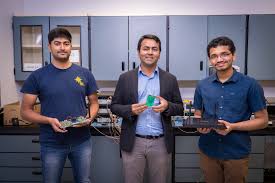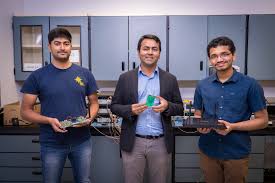
For most college students, a dependable internet connection is something they can easily rely on. However, for students at Claflin University, a small Historically Black College and University (HBCU) in rural Orangeburg, South Carolina, having consistent broadband access was a major challenge. This issue not only affected the university’s ability to provide quality education but also hindered residents in nearby communities from accessing essential online services such as education and healthcare.
Broadband Challenges in Rural South Carolina
Orangeburg, with a population of around 13,300, faces significant connectivity issues. About 21.9% of households lack Internet access, 14% of residents do not have a smartphone, computer, or tablet, and more than 34% live below the poverty line. For Claflin University students, internet access was often unreliable, particularly in dormitories and outdoor areas. The COVID-19 pandemic further exposed the depth of these challenges, highlighting how difficult it was for the school to deliver remote education effectively.
"When I first came to Claflin, we were in what you might call a broadband desert," said Dr. Arthur Doctor, dean of students at Claflin University. "Our students were struggling to access academic resources, and there were challenges in staying connected as a campus community." Dr. Doctor, a native of South Carolina and a lifelong educator, understood how the lack of reliable broadband was affecting his students' educational experiences and opportunities for internships and jobs.
A Transformative Partnership
When the chance arose to collaborate with Cisco and its partners, including the Student Freedom Initiative, to deploy 5G/LTE services on campus and in the surrounding area, Dr. Doctor saw it as a game-changer. The initiative would not only transform Claflin University but also benefit neighboring South Carolina State University and local residents.
"We teamed up with Cisco to launch an ambitious pilot program that allows us to connect our campus like never before," said Dr. Doctor. "This impacts not just our students and staff, but also a nearby HBCU and, most importantly, the Orangeburg community that we have been part of since 1869. Bridging the digital divide is about connecting people, and Wi-Fi is central to that. In a technology-driven society, linking Claflin with the Orangeburg community through this partnership is transformative."
The pilot program, funded by Cisco’s Country Digital Acceleration initiative, provided Claflin with a private 5G network aimed at closing the connectivity gap for both the campus and surrounding areas where many residents could not afford high-speed internet. Cisco also performed a NIST assessment to ensure the university qualified for critical Title IV funding and donated $1.7 million in equipment and services as part of an IT modernization effort. Furthermore, Cisco is offering training to Claflin’s IT staff, providing upskilling through its Networking Academy, and has implemented a student help desk to support the broader community. Claflin also hosted Cisco’s first Cybersecurity Resilience workshop, which aims to prepare students for careers in cybersecurity.
Building a Brighter Future
The partnership between Claflin and Cisco has become a model for other HBCUs nationwide. Claflin students now enjoy greater access to academic resources and can stay connected with family and support networks. Instructors and administrators can more easily provide students with essential tools, both on-campus and remotely. This collaboration is also improving connectivity for the local community and nearby institutions. With a sustainable model in place, the partnership promises to benefit Claflin and the Orangeburg community for years to come.
“I see myself each and every day in our students. And it really has allowed me to be passionate about the work that I’m able to do. When I’m here late at night or on the weekends, it really just makes me smile to see that they’re having an experience that they can look back on as one that’s been positive and impacted them in a tremendous way.”
Learn more about Cisco Social Justice
Broadband Challenges in Rural South Carolina
Orangeburg, with a population of around 13,300, faces significant connectivity issues. About 21.9% of households lack Internet access, 14% of residents do not have a smartphone, computer, or tablet, and more than 34% live below the poverty line. For Claflin University students, internet access was often unreliable, particularly in dormitories and outdoor areas. The COVID-19 pandemic further exposed the depth of these challenges, highlighting how difficult it was for the school to deliver remote education effectively.
"When I first came to Claflin, we were in what you might call a broadband desert," said Dr. Arthur Doctor, dean of students at Claflin University. "Our students were struggling to access academic resources, and there were challenges in staying connected as a campus community." Dr. Doctor, a native of South Carolina and a lifelong educator, understood how the lack of reliable broadband was affecting his students' educational experiences and opportunities for internships and jobs.
A Transformative Partnership
When the chance arose to collaborate with Cisco and its partners, including the Student Freedom Initiative, to deploy 5G/LTE services on campus and in the surrounding area, Dr. Doctor saw it as a game-changer. The initiative would not only transform Claflin University but also benefit neighboring South Carolina State University and local residents.
"We teamed up with Cisco to launch an ambitious pilot program that allows us to connect our campus like never before," said Dr. Doctor. "This impacts not just our students and staff, but also a nearby HBCU and, most importantly, the Orangeburg community that we have been part of since 1869. Bridging the digital divide is about connecting people, and Wi-Fi is central to that. In a technology-driven society, linking Claflin with the Orangeburg community through this partnership is transformative."
The pilot program, funded by Cisco’s Country Digital Acceleration initiative, provided Claflin with a private 5G network aimed at closing the connectivity gap for both the campus and surrounding areas where many residents could not afford high-speed internet. Cisco also performed a NIST assessment to ensure the university qualified for critical Title IV funding and donated $1.7 million in equipment and services as part of an IT modernization effort. Furthermore, Cisco is offering training to Claflin’s IT staff, providing upskilling through its Networking Academy, and has implemented a student help desk to support the broader community. Claflin also hosted Cisco’s first Cybersecurity Resilience workshop, which aims to prepare students for careers in cybersecurity.
Building a Brighter Future
The partnership between Claflin and Cisco has become a model for other HBCUs nationwide. Claflin students now enjoy greater access to academic resources and can stay connected with family and support networks. Instructors and administrators can more easily provide students with essential tools, both on-campus and remotely. This collaboration is also improving connectivity for the local community and nearby institutions. With a sustainable model in place, the partnership promises to benefit Claflin and the Orangeburg community for years to come.
“I see myself each and every day in our students. And it really has allowed me to be passionate about the work that I’m able to do. When I’m here late at night or on the weekends, it really just makes me smile to see that they’re having an experience that they can look back on as one that’s been positive and impacted them in a tremendous way.”
Learn more about Cisco Social Justice


 Claflin University and Cisco Partner to Bridge Digital Divide with 5G and Broadband Solutions
Claflin University and Cisco Partner to Bridge Digital Divide with 5G and Broadband Solutions




 Companies
Companies